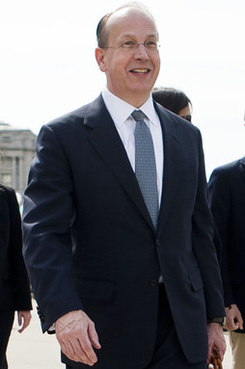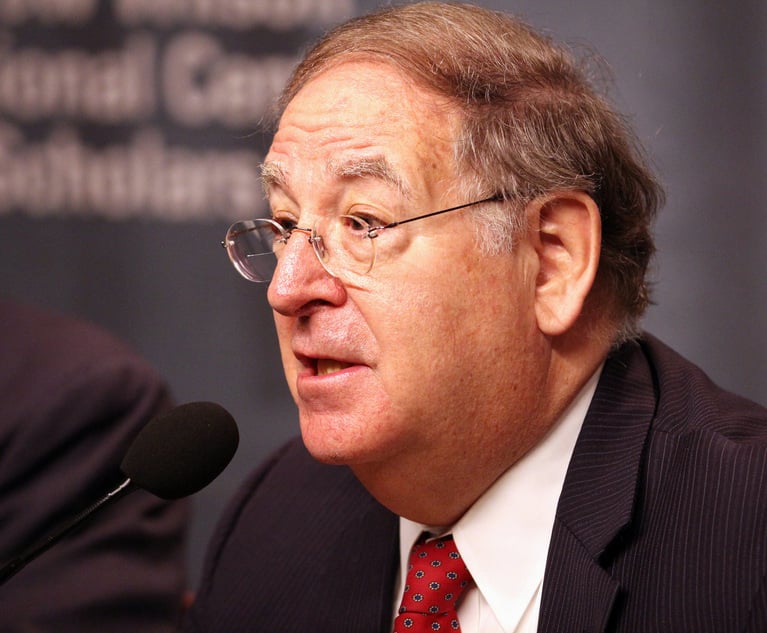No, Justice Ginsburg and Former US Solicitors Are Not Advising This Crypto Company
"I am not into cryptocurrency—I generally try to avoid things that start with crypto," Paul Clement says. The Texas State Securities Board, in a cease-and-desist order, said a crypto company was promoting—wrongly—that RBG and a group of former U.S. solicitors were advising the outfit.
March 01, 2018 at 01:20 PM
5 minute read
 Supreme Court Justice Ruth Bader Ginsburg waves at NYU Law School on Monday, Feb. 5th, 2018. Photo credit: David Handschuh
Supreme Court Justice Ruth Bader Ginsburg waves at NYU Law School on Monday, Feb. 5th, 2018. Photo credit: David Handschuh Justice Ruth Bader Ginsburg and former U.S. Solicitors General Theodore Olson, Seth Waxman and Paul Clement have an obvious professional connection but never one as legal overseer for an online company promoting cryptocurrency investments in Texas.
The Texas State Securities Board this week sent a cease-and-desist letter to a company called LeadInvest, which allegedly was using a photograph of the justice and the lawyers, including former deputy Solicitor General Maureen Mahoney of Latham & Watkins, as its “CodeOfEthics Association.” LeadInvest billed itself as a technology company developing trading software for cryptocurrency markets, according to the Texas state board.
Among six counts—with multiple subparts—of misleading and deceptive statements listed in the board's letter was this eye-popping one:
“Respondent LEADINVEST is claiming that the 'CodeOfEthics [sic] Association' is responsible for contract law, due diligence and corporate law, and it is providing a photograph that purports to portray the members of 'CodeOfEthics [sic] Association.' Respondent LEADINVEST is not telling investors that the photograph of the members of the 'CodeOfEthics [sic] Association' actually depicts former Deputy Solicitor General Maureen Mahoney, former Solicitor General Theodore Olson, Supreme Court Associate Justice Ruth Bader Ginsburg, former Solicitor General Paul Clement, and former Solicitor General Seth Waxman.”
The state board accused the company of failing to tell investors that the photograph was the same one that ran in a 2005 article about a George Washington School of Law event titled “Symposium Honors Rehnquist's Legacy/Supreme Court Justice Ruth Bader Ginsburg Delivers Keynote Address.” The law school owns the image and did not give permission to LeadInvest to use it, according to the board. O'Melveny & Myers partner Walter Dellinger also appeared in the photograph.
The Texas securities board said George Washington law school had not given LeadInvest permission to use the photo.
Olson, who leads the Supreme Court and appellate practice at Gibson, Dunn & Crutcher and was U.S. solicitor general during the George W. Bush administration, told The National Law Journal that the company's name-drop of him was obviously “all bogus.” He also disclaimed any in-depth understanding of cryptocurrency: “Especially at my age, I'm giving a wide berth to anything involving crypts.”
Kirkland & Ellis partner Clement had a similar reaction.
 Paul Clement
Paul Clement“What a hoot!” said Clement, solicitor general in the second term of the George W. Bush administration. “I am not into cryptocurrency—I generally try to avoid things that start with crypto. That said, I have been known to attend a gathering of former SGs from time to time.”
Mahoney, a retired partner in Latham's Supreme Court and appellate practice, served as deputy solicitor general from 1991 to 1993. Waxman, co-chair of the appellate and Supreme Court litigation practice at Wilmer Cutler Pickering Hale and Dorr, was solicitor general in the Clinton administration from 1997 through 2001. Neither Mahoney nor Waxman was available to comment.
Other photographs on the LeadInvest website, according to the Texas securities board, featured images of lawyers at firms in California and North Carolina that had no affiliation with the crypto company.
The Texas board's cease-and-desist letter was addressed to a web hosting company with a P.O. Box in Panama. A contact there was not immediately found. The LeadInvest website redirects to another cryptocurrency site that disclaims there is no single owner or entity. LeadInvest has 31 days to request a hearing at the Texas securities board. Any failure to request a hearing results in the agency's order becoming final.
Joe Rotunda, director of enforcement for the Texas securities board, told the San Antonio Express-News that the agency is receiving a number of consumer complaints about fraudulent cryptocurrency products.
“I think a lot of it comes out to being a product of the internet, where anyone can be anonymous. Anyone can kind of put up anything on the internet,” Rotunda told the Express-News. “And that includes pictures of a Supreme Court justice, and former solicitors general and attorneys who are completely unrelated to the offer and sale of cryptocurrency investments. It's brazen, it's threatening, it's hurt a lot of people.”
The Texas State Securities Board order is posted below:
Read more:
'He's Not Bashful' Ted Olson Evaluates Gorsuch's Silence in Unions Argument
How Wilmer's Seth Waxman Became Dean of SCOTUS Death Penalty Defense
Ruth Bader Ginsburg Seized the #MeToo Moment. Here's What She Is Saying
Lawyers Getting Paid in Bitcoin (Mostly) Like It
Texas Leads Nation in Pushback Against Fraudulent Crypto Schemes
This content has been archived. It is available through our partners, LexisNexis® and Bloomberg Law.
To view this content, please continue to their sites.
Not a Lexis Subscriber?
Subscribe Now
Not a Bloomberg Law Subscriber?
Subscribe Now
NOT FOR REPRINT
© 2025 ALM Global, LLC, All Rights Reserved. Request academic re-use from www.copyright.com. All other uses, submit a request to [email protected]. For more information visit Asset & Logo Licensing.
You Might Like
View All
Read the Document: DOJ Releases Ex-Special Counsel's Report Explaining Trump Prosecutions
3 minute read
Crypto Exchange’s ‘Meteoric Rise’ Leads to Nationwide Class Action Trend
4 minute read
Veteran Federal Trade Law Enforcer Joins King & Spalding in Washington
4 minute read
'Thoughtful Jurist': Maryland US District Senior Judge Messitte Dies After Short Illness
4 minute readTrending Stories
- 1SEC Files Lawsuit Against Elon Musk Over Untimely Twitter Ownership Disclosure
- 2Survey Finds Majority of Legal Professionals Still Intimidated by AI Despite Need to Streamline Mounting Caseloads
- 3FTC Launches Inquiry of Single-Family Rental Home 'Mega Investors,' Issues PBM Report
- 4Womble Bond Dickinson's Wilmington Office Sees New Leadership as Merger Is Completed
- 5Defending Against a $290M Claim and Scoring a $116M Win in Del. Drug Patent Fight
Who Got The Work
J. Brugh Lower of Gibbons has entered an appearance for industrial equipment supplier Devco Corporation in a pending trademark infringement lawsuit. The suit, accusing the defendant of selling knock-off Graco products, was filed Dec. 18 in New Jersey District Court by Rivkin Radler on behalf of Graco Inc. and Graco Minnesota. The case, assigned to U.S. District Judge Zahid N. Quraishi, is 3:24-cv-11294, Graco Inc. et al v. Devco Corporation.
Who Got The Work
Rebecca Maller-Stein and Kent A. Yalowitz of Arnold & Porter Kaye Scholer have entered their appearances for Hanaco Venture Capital and its executives, Lior Prosor and David Frankel, in a pending securities lawsuit. The action, filed on Dec. 24 in New York Southern District Court by Zell, Aron & Co. on behalf of Goldeneye Advisors, accuses the defendants of negligently and fraudulently managing the plaintiff's $1 million investment. The case, assigned to U.S. District Judge Vernon S. Broderick, is 1:24-cv-09918, Goldeneye Advisors, LLC v. Hanaco Venture Capital, Ltd. et al.
Who Got The Work
Attorneys from A&O Shearman has stepped in as defense counsel for Toronto-Dominion Bank and other defendants in a pending securities class action. The suit, filed Dec. 11 in New York Southern District Court by Bleichmar Fonti & Auld, accuses the defendants of concealing the bank's 'pervasive' deficiencies in regards to its compliance with the Bank Secrecy Act and the quality of its anti-money laundering controls. The case, assigned to U.S. District Judge Arun Subramanian, is 1:24-cv-09445, Gonzalez v. The Toronto-Dominion Bank et al.
Who Got The Work
Crown Castle International, a Pennsylvania company providing shared communications infrastructure, has turned to Luke D. Wolf of Gordon Rees Scully Mansukhani to fend off a pending breach-of-contract lawsuit. The court action, filed Nov. 25 in Michigan Eastern District Court by Hooper Hathaway PC on behalf of The Town Residences LLC, accuses Crown Castle of failing to transfer approximately $30,000 in utility payments from T-Mobile in breach of a roof-top lease and assignment agreement. The case, assigned to U.S. District Judge Susan K. Declercq, is 2:24-cv-13131, The Town Residences LLC v. T-Mobile US, Inc. et al.
Who Got The Work
Wilfred P. Coronato and Daniel M. Schwartz of McCarter & English have stepped in as defense counsel to Electrolux Home Products Inc. in a pending product liability lawsuit. The court action, filed Nov. 26 in New York Eastern District Court by Poulos Lopiccolo PC and Nagel Rice LLP on behalf of David Stern, alleges that the defendant's refrigerators’ drawers and shelving repeatedly break and fall apart within months after purchase. The case, assigned to U.S. District Judge Joan M. Azrack, is 2:24-cv-08204, Stern v. Electrolux Home Products, Inc.
Featured Firms
Law Offices of Gary Martin Hays & Associates, P.C.
(470) 294-1674
Law Offices of Mark E. Salomone
(857) 444-6468
Smith & Hassler
(713) 739-1250










